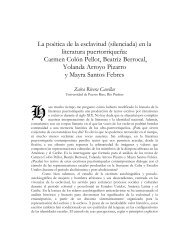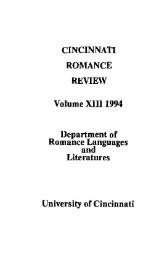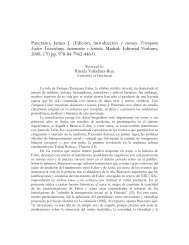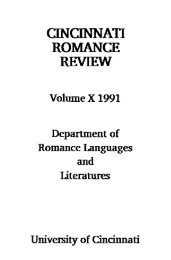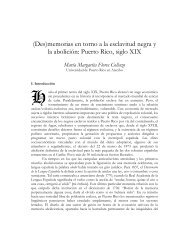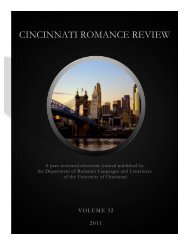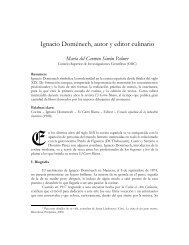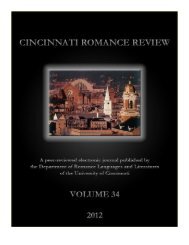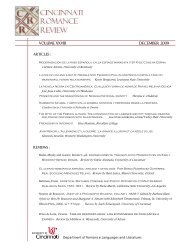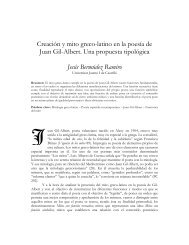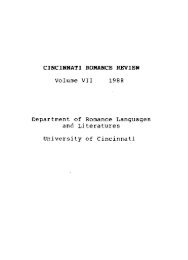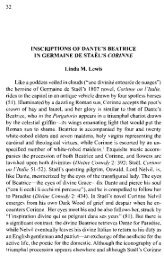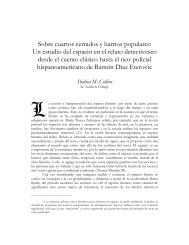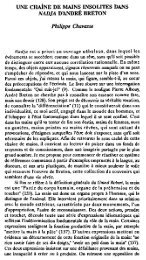Volume 30 (2011) - Cincinnati Romance Review
Volume 30 (2011) - Cincinnati Romance Review
Volume 30 (2011) - Cincinnati Romance Review
You also want an ePaper? Increase the reach of your titles
YUMPU automatically turns print PDFs into web optimized ePapers that Google loves.
WOMANISM AND SOCIAL CHANGE 119<br />
disenfranchised speaking out against the powerful whose interest is the preservation of<br />
power, not necessarily doing what is right or just” (171). In Morgades’ Antígona this<br />
purpose of life is clearly stated at the beginning of the play, more specifically the second<br />
time the chorus comments on the protagonist:<br />
Las leyes de Dios, las leyes humanas, las leyes de la conciencia, las leyes<br />
de la sociedad. ¿Cuál de ellas es la primera? ¿Cuál de ellas hemos de<br />
cumplir? Antígona ha cumplido con una de ellas, se siente liberada de sí<br />
misma, se siente liberada de dudas. Pero por esto va a morir… No se<br />
promulga la ley para el justo, sino para los desaforados, los<br />
ingobernables, los impíos y los pecadores, los faltos de bondad amorosa,<br />
los profanos, los parricidas y matricidas, los homicidas, los fornicadores,<br />
los mentirosos, los perjuros. Antígona es honesta, es joven, es buena.<br />
Toda ella es deber y justicia, toda ella es amor. ¿Por qué tiene que morir?<br />
(427)<br />
In the words of the chorus, the subject has to confront the binary between<br />
natural law and human law, and only by following one of them can the individual find<br />
real freedom. Antígona’s acts, not her words, have shown that she chose right, favoring<br />
justice, duty, love, even when that will cost her own life. It is important to note that in<br />
this play it is the chorus, not Antígona herself, who attributes to the woman the ability<br />
to represent GuineoEquatorians or lead them in the right path. The ample space that<br />
comments about Antígona take in the drama, provided by “voces” (or chorus),<br />
“hombres” and “soldados” build her up as a communal hero, stressing the ways in<br />
which they perceive the effects of her actions in society.<br />
Set in Equatorial Guinea under Macias’ postcolonial rule, referring to his<br />
dictatorship (1968-1979), the play dramatizes moments of severe oppression and uses<br />
Antígona as a representative of the struggle against his abuses. Through Antígona’s<br />
experiences, Morgades acknowledges the suffering and marginalization that Macias’<br />
government brought to the national population. While the different interpretations<br />
given to Sophocles’ Antigone have paid attention to juridical, political, historical and<br />
religious issues (Rodríguez 10), in this adaptation there is an emphasis on the political,<br />
coinciding with others done in various postcolonial contexts:<br />
Thus, the appeal to African theatre artists and audiences of this text<br />
includes the inherent conflicts between the disfranchised and the ruling<br />
elite which the text presents, the opportunity to explore the idea of what<br />
makes a “good citizen” and what is “good citizenship,” the theme of<br />
resistance to oppression, oppression in the form of the governing power<br />
represented as a single powerful individual, the theme of resistance to<br />
power and its capricious display through unjust laws, the theme of<br />
<strong>Cincinnati</strong> <strong>Romance</strong> <strong>Review</strong> <strong>30</strong> (Winter <strong>2011</strong>): 117-129.



